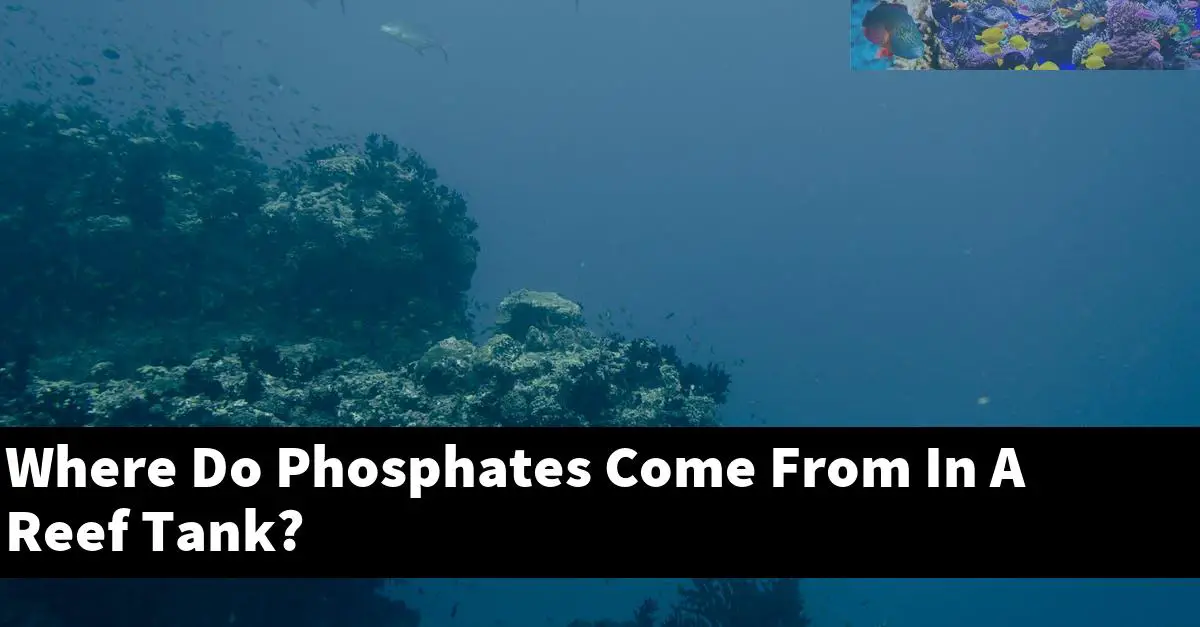Phosphates are typically introduced into reef tanks through the use of phosphate-rich foods, such as fish food or marine algae. Phosphates can also be introduced through the use of certain chemicals, such as phosphate-based cleaners. In some cases, phosphates may also be present in the tap water used to fill the reef tank.
Where do phosphates come from in a reef tank?
Phosphates are a common mineral in reef tanks and come from a variety of sources. Some may be supplied by the caretaker, while others may be found naturally in the water.
Phosphates can be used by corals and other organisms to build their skeletons and shells, and they are also important for the growth of algae.
How do phosphates affect reef tanks?
Phosphates are a type of mineral that can be found in reef tanks. Phosphates can be beneficial to reef tanks, as they can help to buffer the water against fluctuations in ph levels.
Phosphates can also help to promote the growth of coral, as well as contribute to the overall health and stability of the reef tank.
What are the benefits of having phosphate in a reef tank?
There are a few benefits of having phosphate in a reef tank. Phosphate serves as a nutrient for coral and other reef organisms, and it is also a natural calcium supplement for fish.
Additionally, phosphate can be used to help control algae growth.
Is there any downside to having phosphate in a reef tank?
There are a few potential downsides to having phosphate in a reef tank. Phosphate can lower the ph of the water, potentially causing coral bleaching.
It can also promote the growth of algae, which can then clog up the filters and cause problems for the reef. Finally, phosphate can also lead to the formation of toxic byproducts in the water, which can be harmful to fish and coral.
How can you remove phosphate from a reef tank?
Phosphate is a common mineral that is often found in reef tanks. It can be removed from a reef tank by using a phosphate remover.
This will remove the phosphate from the water and reef tank.
What are some methods for preventing phosphate build-up in a reef tank?
There are several ways to prevent phosphate buildup in a reef tank. Some options include using a phosphate remover, keeping the tank clean, and using a phosphate absorber.
One option for preventing phosphate buildup is using a phosphate remover. This removes phosphate from the water, preventing it from building up in the tank.
Some phosphate removers use chemicals, while others use physical processes. Keeping the tank clean is also an option for preventing phosphate buildup.
This means keeping the tank clean and clear of debris, which can help reduce the amount of phosphate that enters the tank. Finally, a phosphate absorber can be used to reduce the amount of phosphate in the water.
This can be done by adding the absorber to the tank, or by adding it to the water before it enters the tank.
What are the consequences of having too much phosphate in a reef tank?
There are a few potential consequences of having too much phosphate in a reef tank. One issue is that phosphate can cause calcium depletion in the tank, which can lead to coral bleaching and other problems.
Additionally, high levels of phosphate can also lead to the formation of toxic runoff, which can damage fish and coral. Finally, high levels of phosphate can also damage the coral reef environment in general, leading to a decline in overall biodiversity.
How fast can you lower phosphates in a reef tank?
Phosphates are a major concern for reef tanks as they can lead to algae growth. While there are several ways to lower phosphates, some methods are faster than others.
One of the quickest ways to reduce phosphates is by using a phosphate remover. These products work by binding to phosphates and removing them from the water.
Another fast method is to use an RO/DI filter. This type of filter removes phosphates and other impurities from the water, making it safe for reef tanks.
Summary
Phosphates can be harmful to fish, coral, and other marine life if they are not properly eliminated from the water. Phosphates can also accumulate in the tanks over time, leading to a decline in the health of the reef.

